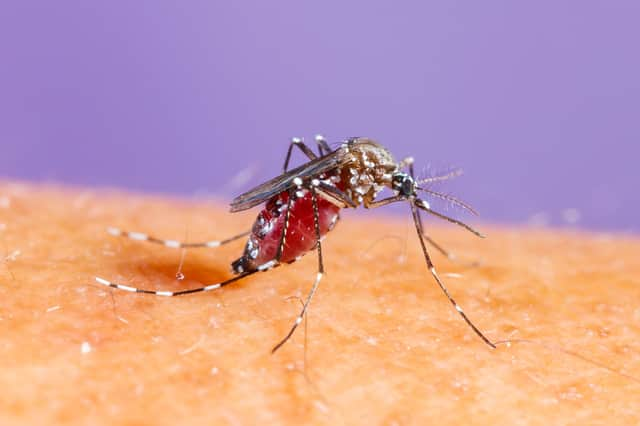Dengue fever: Symptoms explained as cases surge in Caribbean and South America - and will it reach the UK


The number of dengue fever cases in the Caribbean and South America is set to explode - and health experts say the climate could be to blame.
Health officials in Brazil have warned that cases could hit a record five million this year, with the Caribbean already experiencing hundreds of cases in 2024. Dr Terrence Drew, prime minister of St Kitts and Nevis, said this is down to "a change in the rainfall patterns," with GGTN America reporting that the Caribbean will be "on the front lines" of battling the disease.
Advertisement
Hide AdAdvertisement
Hide AdDengue fever is an infection spread by mosquitoes, with severe infections leading to symptoms such as hyperventilating, repeatedly being sick and having blood in your stool.
High temperature
Severe headache
Pain behind your eyes
Muscle and joint pain
Feeling or being sick
Swollen glands
Blotchy rash made up of flat or slightly raised spots
Now, health experts believe that changes to the El Nino weather pattern will make dengue fever even more contagious.
Ethel Maciel, secretary of surveillance at the Brazilian health ministry, told the Financial Times: "We have a situation that is very worrying because of climate change [and] mainly the El Niño phenomenon. There will be [an acceleration] in transmission.
"For the first time in a long time we have four variants circulating in Brazil. [One variant] had not been present since 2007, so we will have many susceptible people."
Advertisement
Hide AdAdvertisement
Hide AdThe Turks and Caicos Islands (TCI) have already reported more than 170 dengue cases alone since January 1. There, the Ministry of Health and Human Services has started issuing free testing kits for residents.
A spokesperson for the department said: "Since the beginning of the dengue outbreak in the TCI, the Ministry of Health has identified 172 cases of dengue
"There is no specific treatment for dengue. If you suspect that you or a loved one has dengue, please see your healthcare provider so you can be tested and receive the necessary advice. Avoid taking non-steroidal anti-inflammatory drugs, like ibuprofen and aspirin.
"Persons who are suspected to have dengue or have confirmed dengue should avoid further mosquito bites. The mosquitoes that spread dengue are active during the day - clean environments, sanitation, and public awareness is crucial."
Advertisement
Hide AdAdvertisement
Hide AdThere are concerns among health experts that dengue fever could one day reach UK shores. This is because rapid climate change will invite mosquitos to migrate - with many already striking some European regions last summer.
UKHSA chief executive Professor Dame Jenny Harries said: "Things that when I trained many years ago were called tropical diseases will actually become national domestic diseases. In the summer of 2022, UK temperatures reached above 40 degrees Celsius for the first time on record.
"We had nearly 3,000 excess deaths recorded across that extended heat period while many other countries have experienced bouts of intense and prolonged heat in recent months."
Comment Guidelines
National World encourages reader discussion on our stories. User feedback, insights and back-and-forth exchanges add a rich layer of context to reporting. Please review our Community Guidelines before commenting.
